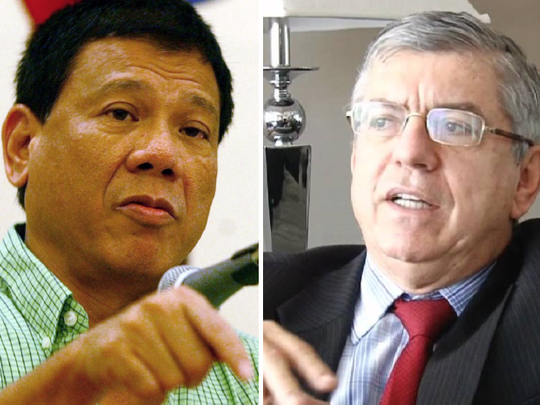
Manila: President Rodrigo Duterte has called a former Colombian president “idiot” for criticising Philippines’ war against illegal drugs, which has killed more than 7,000 since July.
“I was told that Colombia [and its former President Cesar Gaviria, who ruled from 1990 to 1994] has been lecturing me [about my anti-drug campaign] … that idiot,” Duterte said in a speech during the Bureau of Customs’ 115th founding anniversary. He did not identify the target of his ire.
“You can still communicate [after taking cocaine and heroin from Colombia]. One year of using shabu [which poor Filipinos prefer], you will lose your sanity,” Duterte said, adding, “Shabu is a virulent chemical” while cocaine including heroin are “quite OK” or “less destructive”.
Responding to Gaviria’s suggestion that Duterte should strengthen public health in fighting illegal drug trade, Philippine Presidential spokesperson Secretary Ernesto Abella said Duterte’s campaign “began to address not just crime and illegal drugs, but also broadened government efforts into a public health issue”.
“More than a national security problem, the proliferation of drugs in the country has been regarded as a health pandemic,” Abella said, adding, “The second phase of the President’s anti-drug campaign focuses on the treatment and rehabilitation of drug dependents.”
Under Duterte’s watch, drug abuse treatment and rehabilitation centres were erected in Fort Magsaysay, Nueva Ecija, northern Luzon; and at a military camp in Agusan del Sur, southern Philippines, both of which were opened in 2016, said Abella, adding a Philippine government-run medical insurance agency, Philhealth, has already covered a two-week drug rehabilitation programme at P10,000 (Dh833.33) per member.
“It is unfortunate that international attention to the drug war in the Philippines centres on drug-related killings rather than on the breakthroughs of the campaign,” said Abella.
Gaviria’s opinion article in the New York Times said, “[Duterte’s plan of] bringing in the army [through an executive order] to fight the drug war, as he now suggests, would also be disastrous.”
“Throwing more soldiers and police at the drug users is not just a waste of money but also can actually make the problem worse. Locking up non-violent offenders and drug users almost always backfires, instead strengthening organised crime,” said Gaviria.
“This is a test that many of my Colombian compatriots have failed. I hope Mr Duterte does not fall into the same trap,” said Gaviria, who suggested meeting basic rights, minimising unnecessary pain and suffering, decriminalising drug users, supporting alternative sentencing for low-level non-violent offenders and providing a range of treatment options for drug abusers.
Gaviria also asked Duterte to focus on economic development. But Abella said he did not mention Duterte’s allotment of P7 trillion (Dh583,3 billion) for infrastructure development in the Philippines in the next six years.
Gaviria brought to justice drug kingpin Pablo Escobar in the 1990s. After leading Colombia from 1990 to 1994, Gaviera founded the Global Commission on Drug Policy. Colombia is one of the world’s major cocaine suppliers.
Amnesty International, a rights group, criticised Philippine policemen who allegedly received additional payments as incentive to kill suspected drug pushers and users; and for bringing dead bodies to funeral homes.
Of the 7,600 suspected Filipino drug pushers and users killed since July, the police claimed responsibility for 2,500 deaths and blamed drug syndicates and turf wars for the rest of the fatalities.
Philippine authorities say the illegal drug trade in the country reached $4.8 billion in 2013.











